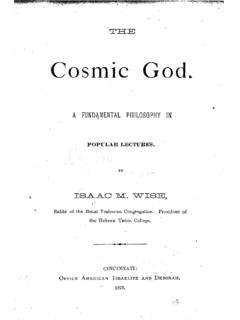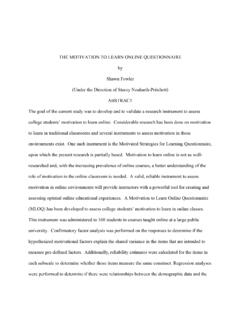Transcription of Hans-Georg Gadamer’s philosophical hermeneutics: Concepts ...
1 META: Research in Hermeneutics, Phenomenology, and Practical Philosophy IV (2) / 2012 286 META: RESEARCH IN HERMENEUTICS, PHENOMENOLOGY, AND PRACTICAL PHILOSOPHY VOL. IV, NO. 2 / DECEMBER 2012: 286-303, ISSN 2067-3655, Hans-Georg Gadamer s philosophical hermeneutics: Concepts of reading, understanding and interpretation Paul Regan University of Central Lancashire Abstract Hans-Georg Gadamer s philosophical hermeneutics is a popular qualitative research interpretive method aiming to explore the meaning of individual experiences in relation to understanding human interpretation. Gadamer identifies that authentic engagement with reading requires awareness of the inter-subjective nature of understanding in order to promote a reflective engagement with the text. The main Concepts of Gadamer s view of reading and understanding are explored in this paper in relation to interpreting text. Concepts such as; inter-subjectivity, Being, authenticity, fore-structure, pre-suppositions, prejudice, temporality and history are all help to enhance health and social science researchers understanding of his theory and its application.
2 Keywords: Gadamer, philosophical hermeneutics, Reading, Understanding, Interpretation, Qualitative research Introduction Hans-Georg Gadamer (1900-2002) was an influential German philosopher of the twentieth century, inspiring a variety of scholastic disciplines from aesthetics to theology. In suggesting understanding was interpretation and vice versa, Gadamer identifies language acting as the medium for understanding and a means of sharing the complexities of human experience (Gadamer 2004a). From the ground breaking work of his teacher and friend Martin Heidegger, Gadamer wrote about human subjectivity and developing a critical and dialogical Paul Regan / Hans-Georg Gadamer s philosophical hermeneutics 287 approach to philosophical hermeneutics in his magnus opus Truth and Method (2004a) first published in 1960. The purpose of this paper This paper aims to articulate Gadamer s work in relation to reading, understanding and interpretation for health and social science researchers.
3 Gadamer s key Concepts are of particular concern for qualitative researchers intending to use philosophical hermeneutics for interpreting research participants narrative and findings. The researchers own experience of reading and understanding are important when relating Concepts of pre-supposition (bias, fore-structure), inter-subjectivity, authenticity (being reflective), temporality (time affecting understanding/ emotion), tradition and history (culture) to interpreting the written word. These Concepts are significant because of the central interpretive relationship of the researcher within the qualitative research process. The terms researcher and interpreter are used interchangeably due to the cyclical nature of interpretation. Hermeneutic phenomenology Gadamer s Concepts will be defined to make explicit the working terms in use.
4 Phenomenology underpins the philosophy of Gadamerian philosophical hermeneutics (2004a). Firstly, the word phenomenology comes from the Kantian phenomenon meaning ..that which shows itself in when entities become manifest as the first signification of the word shows itself (Heidegger 2003, 51). First, the semblance of what phenomenology shows conceptualises the word and what it signifies to the interpreter (Heidegger 2003, 51). Second, logos means language (Gadamer 2004b, 59) and relates to Heidegger s discourse and letting ..something be seen through (Heidegger 2003, 56). The vocal signification of a named object connects language as a shared medium of expression (Gadamer 2004a, 408; Gadamer 2004b, 59). Phenomenology focusses on explaining how the primordial thing-in-itself is rooted in the events of life and understanding what is signified by logos through the.
5 Name by which META: Research in Hermeneutics, Phenomenology, and Practical Philosophy IV (2) / 2012 288 something is (Gadamer 2004a, 407). Heidegger and Gadamer s phenomenological inquiry into Being (human existence in the world) therefore enabled a rigorous and critical questioning of something that had been largely taken for granted in philosophy, the primordial understanding of Being (Gadamer 2004a). Hermeneutics is a term derived from the Greek hermeneutikos meaning to interpret (Palmer 1969). Hermeneutics promotes human potential for understanding the meaning of language to expand the infinite possibilities of human thought (Palmer 1969). Developed from theological interpretations and meaning of the Christian Bible hermeneutics aimed to confirm God s authority over the thinking process (Palmer 1969). The early hermeneutics exercised a discriminating power over texts suitability to carry the message of a transcendental wonder (Dilthey) demonstrating, rather than human empowerment, that interpretation with an ideological bias has the capacity to restrict human potential for understanding more fully (Alexander and Numbers 2010).
6 What is significant about Gadamer s hermeneutics is his ontological focus (Being) and capacity to not only interpret human understanding but misunderstanding as a mechanism for effective communication. Understanding language As previously mentioned, the key to investigating Gadamer s concept of understanding is through logos (Gadamer 2004b, 59). Logos is the vehicle for communicating with others, and when we think and speak we ..make what is not present manifest through .. (ing) everything that he (Gadamer 2004a, 391; Gadamer 2004b, 60-61). This means that the word triggers a denoted name given to an object and a resulting mental image (Gadamer 2004b, 62). When thinking of any object we unconsciously join up our internalised thoughts within the shared, externalised medium of communicating with other people (Gadamer 2004b). Therefore the commonality of language ensures a shared acceptance of meaning and ability to vocalise thoughts when alone or when with other people.
7 That relates to the problem of language; we learn to think and use language from the first steps of Paul Regan / Hans-Georg Gadamer s philosophical hermeneutics 289 cognisance, a familiarising engagement experientially with the world and it with us (Aristotle in Gadamer 2004b, 63). This allows the interpreter to develop ways of knowing and predicting the world through the use of their senses of conformity, cohesion and survival within the world (Flinn 2006). Such predictive abilities mean we are always biased in our understanding of the spoken and written language as we become consciously aware of language only in unusual circumstances (Gadamer 2004b). Gadamer suggests three inter-relational points of relevance to language and understanding: Firstly, the universality of language; every dialogue has the potential for inner infinity, an ability to reason, project understanding onto another and read between the lines.
8 This dialogue may be in the form of a reflective journal entry, a research participants narrative or everyday dialogue in the health and social sciences. A questioning mind ensures that language fills in any gaps towards a shared understanding (Gadamer 2004b, 68) opening up human potential for infinite dialogue with others in a fusion of horizons. Secondly, Gadamer refers to the essential forgetfulness of language; when losing the meaning of what is said there is potential for the ..real Being of language to to be reduced (Gadamer 2004b, 64). Gadamer develops the ontological (life experiences of the world) reflexivity of language as a means of communicating the meaning of what others say and write. As will be shown, this ontological freedom encompasses historicity, temporality and authenticity through hermeneutic analysis.
9 Lastly, what Gadamer called I-lessness. When we speak we speak to someone and to our inner selves. When naming the word (in text or visually) we enable the unifying effect of language and communicating with others (Gadamer 2004b, 65). Gadamer suggests there is a presence of spirit evident when using language, for example; projecting hesitancy, anxiety, intention and attitude. Gadamer refers to this as play in the hermeneutic game, a dynamic process of buoyancy, freedom potentiating reality and fulfilment of each players understanding. The play continues in the subjective inner world of thought and the motivation of the interpreter to play the game, to make sense of META: Research in Hermeneutics, Phenomenology, and Practical Philosophy IV (2) / 2012 290 language as a key factor for understanding experience (Gadamer 2004b, 66). I will now expand on these conditions.
10 Language and text The role of the interpreter within Gadamerian hermeneutics has a specific characteristic in understanding human potential, through the ontic-ontology of Heidegger s notion of Being (Heidegger 2003; Gadamer 2004a). The word ontology comes from the Greek language meaning the study of Being, reviewed by Heidegger for contemporary philosophy by situating Being into the average everydayness of life (Heidegger 2003). To Heidegger and Gadamer, understanding the concept of Being and what it is to be human meant that by analysing this most fundamental of Concepts we can then and only then begin to understand how we live and engage in the world through the medium of language (Gadamer 2004a; Gadamer 2004b). Language delivers pointers to the truth concealed within word meaning and reveals that something exists in a (hermeneutic) circle of ontological possibilities (Gadamer 2004a).


